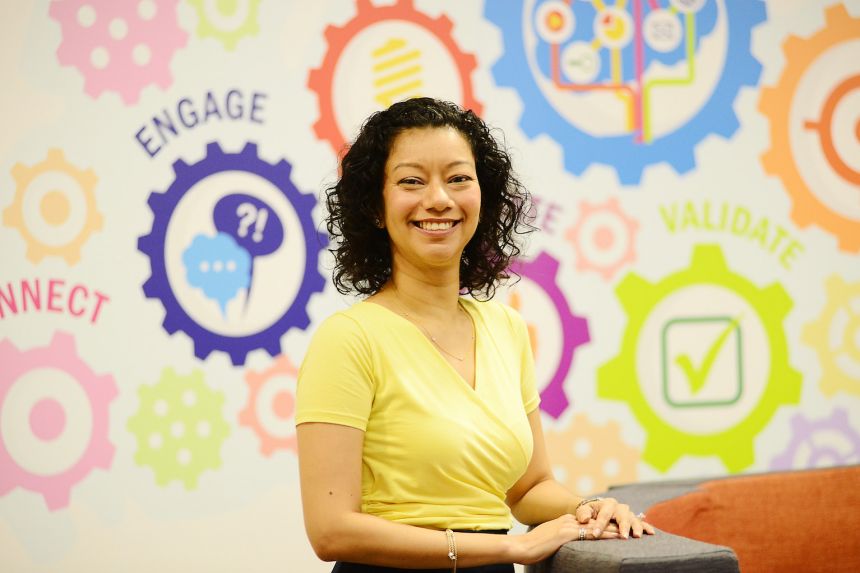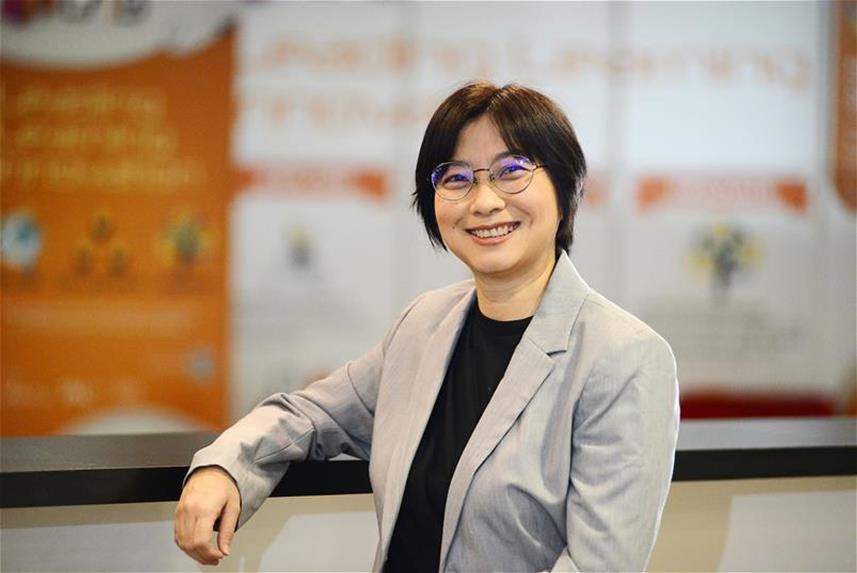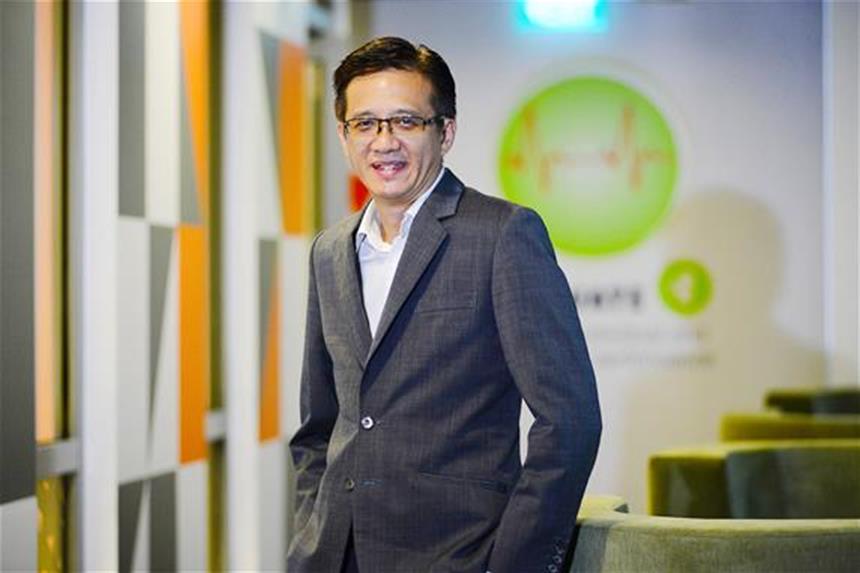Online training can be engaging, meaningful, even fun with the right tech tools and approach, say experts. Here’s why.
 Ms Chandran introduces digital tools that help her learners improve their own online programmes.PHOTOS: THARM SOOK WAI
Ms Chandran introduces digital tools that help her learners improve their own online programmes.PHOTOS: THARM SOOK WAI
Make teaching meaningful with online tools
Ms Shoba Chandran aims to sway those who perceive online learning or teaching as tedious compared to face-to-face classes.
Online teaching offers opportunities and advantages, she says, for both adult learners and educators. And this will be so even after the Covid-19 pandemic.
For learners, there's convenience, shorter classes and information can be provided in easily digestible bite-sized chunks, says Ms Chandran, an adjunct adult educator with the Institute for Adult Learning (IAL). “When learning from home, one doesn’t need to rush from work to the training venue, and then home."
She teaches the Facilitate Technology-Enabled Learning module of the Singapore Workforce Skills Qualifications (WSQ) Advanced Certificate in Learning and Performance (ACLP) programme. The online module lasts 27 hours over seven to eight weeks.
"Online classes are usually shorter. Having smaller segments of learning over a longer period of time minimises learners being overwhelmed with new information in one sitting,” says Ms Chandran, who is in her 40s.
The IAL is an autonomous institute under the Singapore University of Social Sciences. It provides training and upskilling opportunities for adult educators, and undertakes applied research for the development of training and adult education (TAE).
For educators, she says, the ability to teach online has become vital. “My module equips trainers with the skills and knowledge to deliver online programmes.
"This skill has become essential, especially since the start of the Covid-19 crisis, whether the trainer is an aspiring one or a 20-year veteran in the learning and development space.”
For her classes, Ms Chandran pairs each lesson with the introduction of a relevant digital tool to expand her learners’ options when they are preparing their own online courses.
One lesson looks at the challenges that online learners may face, including fear of complicated software. She teaches trainers how to use Google Jamboard, a free and simple tool that looks and works like a whiteboard for students to sketch ideas and solve problems collaboratively.
What does the future hold for internet-based learning?
Ms Chandran feels that Singaporeans, many of whom have experienced online learning because of the pandemic, are taking to the new medium and she is optimistic about the future of online learning.
“There is no doubt that there are many things we cannot replicate online yet. Personally, I miss the opportunities for trainers and learners to get to know one another socially before class, during breaks and after class. But I think the advantages of learning online balance out its limitations.”000.
Adds the founder and chief facilitator of Innovation Matrix, a consultancy that specialises in innovation, train-the-trainer programmes and instructional design: “I believe we are warming up to online learning, and it can be fun, engaging and meaningful for all.”
Engage by adapting, redesigning
Creating a great online course is a skill that can be enhanced, says Ms Eunice Lim, 48, an adjunct adult educator with IAL who teaches its WSQ ACLP, WSQ Diploma in Design and Development of Learning for Performance and WSQ Workplace Learning Facilitator programmes.
 Ms Lim believes that empathy and engagement help when conducting lessons online. PHOTO: THARM SOOK WAI
Ms Lim believes that empathy and engagement help when conducting lessons online. PHOTO: THARM SOOK WAI
The key: Adapt and redesign. “It is not just about using the same content and activities that you planned for face-to-face delivery and doing it online,” says the educator, who has been conducting most of her sessions online since the pandemic began last year.
She, too, has redesigned her classes. "When I’m using Zoom, I make the most of its features, including chat, reactions, polls and annotations, to keep my students engaged. I also use other tech aids, such as Google’s collaboration tools, for more effective interaction between learners and me.
"In virtual classes, learners can be easily distracted, and you may not be able to observe what they are doing behind the screen. So you have to include more frequent activities and engagement throughout the class."
“I also get the learners to interact through ice-breaker activities, and encourage them to share and chat with one another during class. Giving them this social space helps them feel connected and learn better.”
But pivoting to a new form of teaching is more than tailoring lessons to the online medium. Empathy and patience are also crucial, she says.
“Some adult learners may not be digital natives, so giving them assurance and support is key. I try to provide sufficient additional handouts to ensure that everyone is following the lesson.
“Some people also may not have conducive spaces to learn at home, and may face domestic interruptions. Taking such interruptions in your stride and even saying ‘hi’ to their children or pets can make them feel less stressed.”
Adapting to online teaching, and coaching others to do the same, has been challenging, she concedes. But it has also been rewarding.
Ms Lim tells of a student who attended her module on technology-enabled learning before Covid-19 struck, and became a star educator despite his initial doubts about his ability to teach online.
“He told me that he couldn’t imagine what he would do if he needed to conduct lessons online,” recounts Ms Lim, who is also managing director of RE Training & Consultancy, which helps small and medium enterprises and training providers in different sectors implement workplace learning solutions and other learning programmes.
“But when the pandemic hit, he applied what he learnt, and was even voted trainer of the year in his organisation.
“That was one of the best gifts that an adult educator like myself can get.”
Expand by tapping social media
With online tools, adult educators can reach out to a global market for their courses, says Mr Steven Koh, 53, a TAE veteran with over 25 years’ experience teaching local and overseas students.
“Social media has become an important tool for those in the TAE industry to boost demand and tap on new opportunities,” says Mr Koh, who teaches an IAL continuing development programme called Social Media 101 for Coaching, Training and Education Businesses.
 Mr Koh runs a 4,600-strong Facebook group that promotes lifelong learning and the “kampung” spirit. PHOTO: THARM SOOK WAI
Mr Koh runs a 4,600-strong Facebook group that promotes lifelong learning and the “kampung” spirit. PHOTO: THARM SOOK WAI
His one-day programme covers lessons for firms to create an effective social media presence, including how to develop structured content plans and engage prospective clients.
The content of social media posts should be interesting, thought-provoking, current and informative. “Having no content is better than having poor quality content,” he says.
However, it is important to post content in a respectful manner.
“Having proper social media etiquette is critical. This means always being polite and professional, avoiding bragging or complaining about other firms, respecting alternative views and being supportive and encouraging,” he explains.
Mr Koh, who also heads training and consultancy firm Trillion Training, is harnessing the power of social media to promote discussions about digitalisation, learning resources and other topics.
He set up a Facebook group in 2015 named Community of Learning to facilitate sharing of knowledge and best practices among trainers. It has about 4,600 members.
“Besides learning online socially, we also organise offline events and learning seminars for members to meet and learn together. During the pandemic, we have hosted regular online chats,” he says.
“In this day and age, social media skills are critical for both business and life. I hope that through IAL and Community of Learning, more adult educators can learn how to use social media in the right way to expand their possibilities online and globally.”
Institute’s initiatives spur innovation
In 2017, Tan Tock Seng Hospital (TTSH) was looking for a way to assess its staff’s communications skills, especially when dealing with “tricky” interpersonal situations.
Seeking a solution, TTSH took part in the InnovPlus Challenge. The challenge is organised by the Institute for Adult Learning (IAL)'s innovation arm inlab.
The solution sought to scale the teaching of the engagement tools from just 70 a month to about 10,000 employees within 18 months, and allow the learners to practise using a realistic simulation with personalised feedback.
The initiative, run twice a year, offers grants of up to $200,000 to successful proposals that advance continuing education and training through leveraging innovation.
TTSH used its awarded grant from the challenge to partner VisionarySchoolmen (VSM), a capabilities development training firm, to develop a program using artificial intelligence to teach staff to empathise better with patients and their relatives.
One part of the program was to evaluate its staff’s tone of voice, words and facial expressions during video-based simulations of confrontations with patients’ loved ones, with the goal of helping them to improve.
Since then, other organisations have trialled or adopted VSM’s program, with some modifications. Among them was Singapore Airlines, which aimed to train cabin crew on making in-flight announcements, and the Civil Service College to coach front-line service agents.
Besides the InnovPlus Challenge, inlab has created other initiatives to empower TAE professionals and enterprises. These include InnovJam, a grant competition for learning solutions that includes masterclasses and mentorship for participating teams; InnovLogue, a series of bi-monthly seminars and panel discussions; and InnovBite, which provides bite-sized learning sessions.
Last year, IAL also launched its first five-year strategic roadmap to enable a future-ready workforce through TAE education. This includes focusing on upskilling TAE practitioners and enterprises through learning innovation, and conducting research on digital innovations and their impact on learning and collecting data to track progress of the TAE landscape.
-
To learn more about IAL’s programmes for adult educators, click here.
Source: The Straits Times © Singapore Press Holdings Limited. Reproduced with permission.
Sign up for the latest innovation updates
Customise your preferences to receive updates in industries you're interested in.